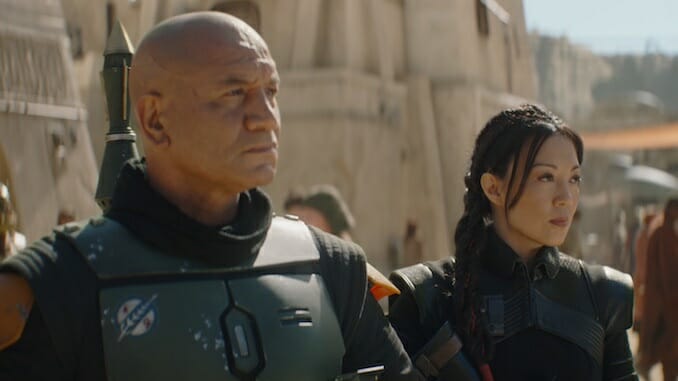Stop the Hyperdrive, I Want to Get Off: Losing Faith in Star Wars TV
Photo Courtesy of Disney+
When The Mandalorian first premiered—hot on the heels of five Star Wars films in four years—viewers thought maybe these small-scale adventures on Disney+ would be the ones to unite us all. We’d be saved from the vitriolic discourse, the unwieldy fan expectations, and sheer meteoric size the Star Wars films came to represent. Many watched both seasons and were left completely satisfied by the stylish set-pieces, teasing guest appearances, and array of Outer Rim worlds creator Jon Favreau and his exciting development team had to offer. But looming above everything was the thought that the show wasn’t really about anything.
No matter, we’ve now moved on from the charms of Baby Yoda to the iconic bounty hunter Boba Fett, who has transfixed audiences since he debuted as the king of the dinosaurs in The Star Wars Holiday Special. And to Favreau’s credit, if any Star Wars icon deserved being thoroughly fleshed out, it’s 1979’s most sought after action figure. After his decidedly muted comeback in The Mandalorian (He wore a costume! Flew a ship! Stood in the background!), it finally came time for him to see some proper, well-developed action. The Book of Boba Fett, however, has turned out to be anything but a page-turner.
In the new series, Boba has assumed Jabba’s throne on Tatooine, and the locals aren’t as instantly thrilled at his new position as the audience are. Parallel to this, we see a flashback showing him post-emergence from the Sarlacc Pit, where he was taken in by a band of Tusken Raiders in the desert sands. There are some initial, obvious issues. Why does Boba Fett want to claim Jabba the Hutt’s throne when he was effectively an independent contractor and Jabba was just a regular commission? By Episode 3, it’s clear he had a reform of character thanks to the Tusken tribe that took him in, but how this extends to the rest of the Tatooine populace is withheld from the audience, leaving gaping questions about his motives and goals in the present-day.
-

-

-

-

-

-

-

-

-

-

-

-

-

-

-

-

-

-

-

-

-

-

-

-

-

-

-

-

-

-

-

-

-

-

-

-

-

-

-

-








































